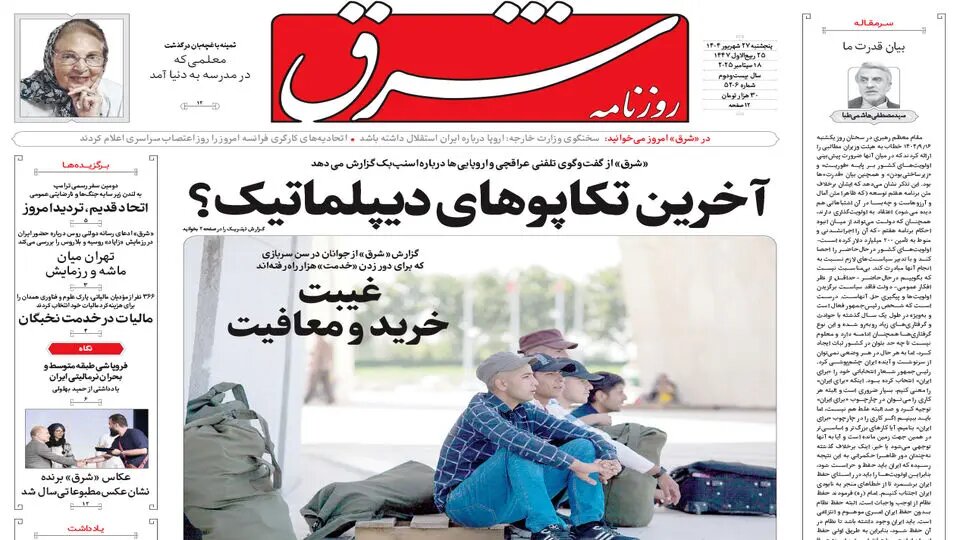"Zapad" exercise in the middle of nuclear deadlock

Shargh analyzed Iran's participation in the "Zapad-2025" joint exercise and wrote: This exercise took place in a situation where only a few days remain until a possible return of (UN) sanctions against Iran.
After months of tough negotiations and the experience of aggression by Israel and the United States, Tehran is still in a diplomatic deadlock, and Europe and the United States, in the nuclear file, not only insist on nuclear transparency by Iran, but also have linked non-nuclear issues such as missile power, regional policies, and even Tehran-Moscow relations to it. From the point of view of Western analysts, Iran's presence in the Zapad exercise with the participation of Russia and Belarus can be considered a tacit confirmation of Tehran's connection with the Moscow axis. Participation in multinational exercises can send a clear message about balancing threats and preventing Iran's geopolitical isolation; a message that is not necessarily seen as a complete alliance with Moscow, but rather an attempt to strengthen deterrence against possible future threats.
Hamshahri: A danger for Europe
In a note, Hamshahri addressed the hardening of Europe's tone against Iran. It wrote: The statements of Mohammad Eslami, head of Iran’s Atomic Energy Organization, about the positive atmosphere of the talks in Vienna, coupled with the hardening of the Europeans' tone can be analyzed as if Europe is unhappy with its waning position in face of Iran. That Europeans have replaced the United States, it has given an opportunity to them to demonstrate that they can play a meaningful role in major global issues, such as the Iranian nuclear negotiations
Therefore, any process that distorts this dream will be dealt with severely. In fact, the European troika is fundamentally not interested in resolving issues with Iran. Now that they have been sidelined by the United States, they are seeking to revive their role in global developments. Therefore, they are constantly looking for excuses. Eslami's statements that their language has become harsher also confirm this, so Europe's concern about losing its position on the Iranian nuclear issue has prompted it to take a harsh tone.
Arman-e-Emrooz: Iran’s agreement with IAEA intended to prevent snapback
Arman-e-Emrooz commented on Iran's agreement with the IAEA and said: The Iran-Agency agreement was the product of several rounds of consultations between the IAEA and Iran in Tehran and Vienna, and at the last stop in Cairo between Araghchi and Grossi. This agreement was reached about two weeks before possible activation of the snapback sanctions; therefore, it remains to be seen whether it can open a door to diplomacy in managing the current crisis. It appears that Tehran’s primary objective under this agreement is to prevent the activation of the snapback mechanism, a condition for which the European troika insisted on full cooperation with the IAEA. For now, the agreement has somewhat increased the chances of a temporary halt to the snapback, but it remains to be seen what the European and American sides will ultimately conclude.
Iran: Tehran seeks to find a common language with Arab countries
The Iran newspaper said the Islamic Republic is facing a fundamental challenge in finding a common understanding about the dangers posed by the Zionist regime of Israel. It wrote: Whenever Iran speaks of the need to contain Israel, many Arab countries fear that Tehran will use this approach to increase its regional influence. This means that though these countries acknowledge the threat of Israeli expansionism, they are unwilling to ally with Iran in confronting the regime. As a result, they are in a state of confusion: on the one hand, they feel threatened by Israel, and on the other hand, they fear the restoration of Iran’s regional power, while in practice, they have not been able to contain the instability caused by Israel’s actions. This situation has resulted in a kind of Arab passivity towards regional developments. In such circumstances, the visit of officials such as Iran’s Supreme National Security chief Ali Larijani to Saudi Arabia or the presence of Iranian delegations at the Doha summit could provide an opportunity to find at least a common language, one that emphasizes the need to contain Israel and the increasing dangers posed by its military adventures. However, there are serious doubts that this process can lead to a level of real security cooperation and the formation of a common front between Iran and the Arab countries.
